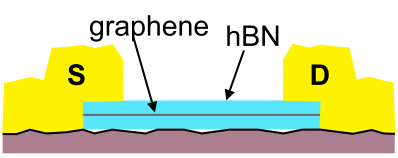New sensitivity record for Hall sensors established

Researchers from RWTH Aachen University and AMO GmbH have set up a new world record for the sensitivity of Hall sensors using highest quality graphene encapsulated in hexagonal boron nitride.
Hall sensors are widely used in automotive and consumer electronics for precise position detection, with an annual production of around 6 billion units. The sensitivity of Hall sensors is essentially material specific and can be increased by using a material with high carrier mobility and low sheet carrier density. Therefore graphene should be the perfect material for Hall sensors, as graphene shows the highest room-temperature carrier mobility of any material and due to is thin body also has a low sheet carrier density.
To explore the ultimate sensitivity of graphene based Hall sensors Dauber and co-workers used graphene encapsulated in hBN, which delivers so far the highest quality under ambient conditions. The graphene based Hall sensors show a voltage and current normalized sensitivity of up to 3 V/VT and 5700 V/AT, respectively. These values are more than one order of magnitude above the values achieved in silicon based Hall sensors and a factor of two above the values achieved with the best III/V semiconductors. This new sensitivity level will enable devices with higher precision, lower energy consumption and also a smaller system size.
The research work is published in the journal Applied Physics Letters:
Jan Dauber, Abhay A. Sagade, Martin Oellers, Kenji Watanabe, Takashi Taniguchi, Daniel Neumaier and Christoph Stampfer “Ultra-sensitive Hall sensors based on graphene encapsulated in hexagonal boron nitride”.
The work is financially supported by the European Commission under the project Flagship Graphene (contract no. 604391) and the ERC (GA-Nr. 280140).




